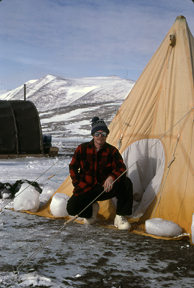James McClintock, Ph.D., has seen animal and plant life struggle for survival during his research trips to the Antarctic Peninsula. He believes the struggle has been brought on by a global rise in temperatures.
 |
| UAB research scientist James McClintock will examine “The Ecological Impacts of Climate Change on the Antarctic Peninsula” in a Discussion Book Dialogue, Thursday, Oct. 16. |
McClintock, an endowed university professor of Polar and Marine Biology, says that warming air is affecting the continent in increasingly visible ways. He will examine “The Ecological Impacts of Climate Change on the Antarctic Peninsula” in a Discussion Book Dialogue, Thursday, Oct. 16. The event is from 11:30 a.m. to 12:30 p.m. in the Blazer Hall Residence Life Center. It is free and open to the public.
McClintock, former dean of the UAB School of Natural Sciences & Mathematics and professor of biology, is an expert in invertebrate chemical ecology, reproduction, nutrition and physiology, particularly in marine invertebrates. He also is an expert on Antarctica and travels there frequently to study the ecology and chemical defenses of marine seafloor organisms.
McClintock is co-author of an article that appeared in the recent July-August edition of American Scientist in which he and his colleagues charge that the Antarctic Peninsula is warming faster than anywhere else on Earth, threatening the rich but fragile ecological community.
McClintock says the changes are dramatic and immediate. One example he cites is the recent discovery of king crabs that may soon threaten the delicate, thin-shelled marine invertebrates.
“Last year for the first time ever, as the sea temperatures are warming along the Antarctic Peninsula, deep sea king crabs were discovered moving up on to the Antarctic continental slope,” McClintock says. “The theory goes they have been excluded from Antarctica because they don’t do well in the cold. But as the water is warming, the physiological barrier that keeps them away is being released, and they’re starting to migrate up on to the shelf. These are large king crabs with large crushing claws. The concern of course is if they move into these communities they’re going to radically alter the whole sea floor community as they crush these shelled invertebrates known to have very thin, fragile, poorly calcified, shells.”
There are other signs of warming, McClintock says. The number of Adélie penguins that inhabit islands off the western shore frequently visited by McClintock is dwindling dramatically. As the air warms along the Peninsula it becomes more humid, which means more snowfall later in the season.
McClintock says 60 percent of the Adélie population now has disappeared.
“The Adélie’s are arriving at the usual time to lay their eggs, but following egg-laying they’re getting buried in the snow; the eggs are not making it because they’re not adapted to being covered with snow or submerged in melt water,” McClintock says.
McClintock will discuss other climate change issues surrounding Antarctica at the Discussion Book dialogues, including a reduction in krill (small shrimp that form the base of the food web), the changing patterns of the chinstrap and gentoo penguins, the migration of fur and elephant seals and the affect of too much carbon dioxide in the atmosphere on the ocean’s acidity.
Log on to wow.uab.edu/antarctica2001 to learn more about McClintock’s trip to Antarctica earlier this year, and visit www.uab.edu/discussionbook for a complete list of Discussion Book activities. You also can read the American Scientist article.